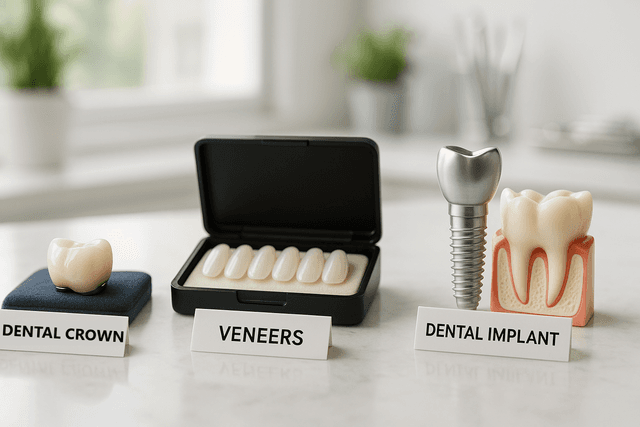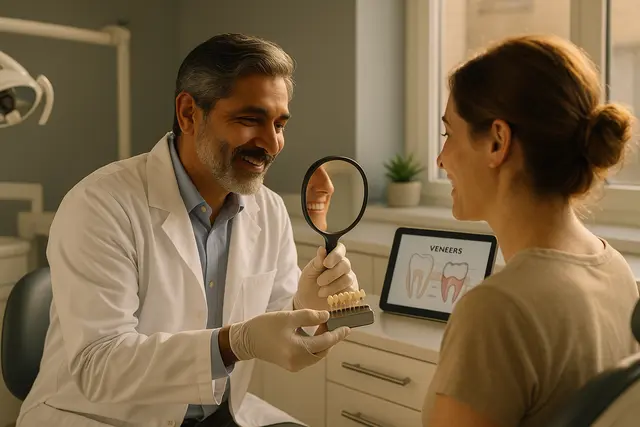Cosmetic Dentistry
5 min read
Aug 15, 2025
Best Treatment to Repair a Damaged Tooth
A damaged tooth can happen to anyone, whether from an accident, biting into something hard, or gradual wear over time. Beyond the discomfort, it can affect your confidence, your ability to chew, and even your overall oral health if left untreated. Modern dentistry offers a variety of effective solutions to restore both the function and appearance of your teeth.

Broken teeth happen. A broken tooth may cause pain, embarrassment, and stress, but here’s the good news: modern dental care has your back. Whether you’ve got a minor chip or a full-on split tooth situation, there’s a treatment option that can restore your smile and help you chew like a champ again.
Why Dental Health Matters More Than You Think
Ignoring dental problems is like ignoring a leaky roof. The longer you wait, the worse, and more expensive, it gets. Broken or chipped teeth aren’t just cosmetic issues. They can lead to infection, sensitivity, and even tooth loss. Early treatment not only prevents pain but protects the enamel that covers your teeth and keeps your natural tooth strong.
Plus, if the pulp (the soft inside of your tooth) is exposed, you could be in for some serious tooth pain. And trust us, that’s not something you want waking you up at 2 a.m.
How Dentists Fix a Damaged Tooth
Your dentist will assess the damage and recommend the best treatment based on how the tooth breaks and how deep the crack or chip goes. A broken tooth may just need a little polishing or could require a root canal. Treatment depends on the tooth’s condition and how much of the tooth must be restored.
Let’s explore what’s in the modern dentistry toolbox.
Small Chip? Dental Bonding to the Rescue
When you barely notice the damage, maybe just a small chip or a little roughness on the edge, your best bet might be dental bonding or dental veneer. Your dentist may use tooth-colored composite resin to shape and polish the surface of your teeth back to normal. It’s a simple fix, usually done in one visit.
Bonding is great for front teeth or any visible areas. While it’s not quite as strong as a dental crown, it’s a fantastic option for minor repairs.
Tooth Repair with Dental Fillings
When a tooth breaks because of a cavity, your dentist will likely recommend a dental filling. Fillings are used to repair chipped, cracked, or decayed areas and restore the tooth’s shape and strength.
A tooth-colored dental filling made from composite resin blends right in with your natural enamel, so no one has to know you ever had a problem in the first place.
When It’s More Than a Chip: Dental Crowns
Now, if you’ve got a fractured tooth or your tooth has suffered more serious damage, a crown might be the hero you need. A dental crown is basically a cap that covers and protects your tooth from further harm.
Crowns are ideal when too much of the tooth is gone to support a filling. They can be made from porcelain, metal, or a mix of both, and they’re designed to look and feel just like your original tooth.
So if you crack a molar while trying to crush ice (please don’t), a crown might be your best treatment.
Root Canal to Save the Tooth
If the damage goes deep enough to hit the tooth pulp, you’ll likely need root canal therapy. This sounds scary, but it’s really not. A root canal removes the infected pulp, cleans the inside, and seals the tooth to prevent further problems.
A root canal can save the tooth when decay or trauma threatens to take it beyond repair. Once complete, your dentist may place a crown on top for extra protection and strength.
This is especially common for cracked or broken molars that take the brunt of your chewing.
Dental Veneers for Chipped Teeth That Show
When the front of the tooth takes the hit, and you’re all about looks, veneers are a sleek fix. A dental veneer is a thin layer of porcelain or composite that’s bonded to the front of the tooth. Veneers are used to repair chipped, worn, or stained teeth and are perfect for a Hollywood-worthy smile.
A dental veneer is more durable and stain-resistant than bonding, making it a solid long-term solution if your front teeth are giving you grief.
Tooth Too Far Gone? Here’s What Happens Next
Sometimes, a tooth is beyond repair. Whether it’s from trauma, untreated tooth decay, or a split tooth that’s cracked all the way to the root, your best option may be a tooth extraction.
After that, a dental implant to replace the missing tooth can restore both function and confidence. A dental implant feels and functions just like a natural tooth, and it’s often paired with a dental crown to complete the look.
You might also consider a dental bridge, which uses nearby teeth to support the replacement. Your dentist will walk you through the different treatment options so you can make an informed decision.
Preventing the Next Dental Emergency
Not all cracked teeth are preventable, but there are ways to avoid common causes. Here are a few practical tips:
Don’t chew on hard things like ice or pens. Seriously.
Wear a mouthguard if you grind your teeth or play contact sports.
See a dentist regularly to catch issues early.
Treat cavities and decay before they become bigger problems.
Avoid using your teeth as tools. That package can wait for scissors.
Good dental care now saves you from an emergency dental appointment later. A little prevention goes a long way.
When to Call the Best Dentist in Town
If your tooth hurts, if you notice a crack in your tooth, or if the tooth doesn’t feel right when you chew, don’t wait. The longer you go without a dental appointment, the more likely you’ll need a more complex dental treatment later.
A broken or chipped tooth is a dental emergency, especially if the pulp is exposed or you’re in pain. The American Dental Association recommends seeing a dental professional ASAP if you break a tooth.
Whether it’s a quick fix or something more involved like root canal therapy, your best dentist will recommend the dental services that match your needs, and your lifestyle.
What Are the Most Common Treatments for a Damaged Tooth?
Treatment depends on the extent of the damage. Small chips may be fixed with dental bonding or veneers, while deeper cracks might require a crown for protection. If the pulp is exposed or infected, root canal therapy can save the tooth. In severe cases where the tooth can’t be saved, extraction followed by a dental implant or bridge may be recommended.
When Is a Broken or Chipped Tooth Considered a Dental Emergency?
A broken or chipped tooth becomes a dental emergency if you experience severe pain, swelling, bleeding, or if the damage reaches the pulp. Immediate care helps prevent infection, further breakage, or tooth loss. Even minor chips should be checked by a dentist to avoid future complications.
How Can a Crown or Veneer Help Restore a Tooth?
A crown acts as a cap that covers the entire tooth, restoring its shape, strength, and appearance. It’s often used after a root canal or for large fractures. Veneers, on the other hand, are thin shells bonded to the front surface of the tooth, ideal for repairing chips or improving appearance while maintaining most of the natural structure.
What Steps Can You Take to Prevent Future Tooth Damage?
Preventive care includes brushing twice daily, flossing, and seeing your dentist regularly. Wearing a mouthguard during sports, avoiding chewing hard objects like ice, and managing teeth grinding can significantly reduce the risk of cracks or breaks. Addressing cavities early also helps maintain strong, healthy teeth.
Read Next
Related Posts

Cosmetic Dentistry
Looking for a Dentist Who Whitens Teeth? Here’s What to Know First
A brighter smile can do wonders for your confidence, but finding the right dentist who whitens teeth takes more than just a quick Google search. From treatment options to experience and safety measures, there are a few key things you should know before booking that whitening appointment.
3 min read
Sep 10, 2025

Cosmetic Dentistry
What Type of Dentist Does Veneers? Here’s Who to Trust With Your Teeth
Dreaming of a flawless, photo-ready smile? Veneers can be a game-changer, but only if you choose the right expert to apply them. Understanding who’s qualified to handle this cosmetic procedure is key to getting results that look natural and last for years.
5 min read
Sep 08, 2025

Cosmetic Dentistry
Cosmetic Dentistry and Implants: How They Work Together
A confident smile can do wonders for your self-esteem, and modern dentistry offers more ways than ever to achieve it. Whether you're dealing with missing teeth or simply want a brighter, more balanced look, cosmetic dentistry and dental implants provide powerful solutions that work hand-in-hand to restore both function and aesthetics.
5 min read
Sep 05, 2025
Don’t have time to research every dentist around you?
See why 30k+ patients trusted us